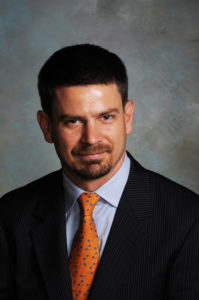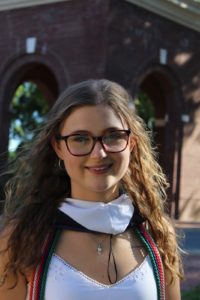As the 20th anniversary of the terrorist attacks of Sept. 11, 2001, draws near, troops are finally leaving the dusty deserts and treacherous mountains of Afghanistan. The departure marks the end of America’s longest war and highlights a full-circle moment for UMW Professor of Political Science and International Affairs Jason Davidson.

“I was always really taken by, to be completely blunt, the brutality of war and its effects on people’s lives,” said Davidson, whose study, The Costs of War to United States Allies Since 9/11, is making waves, landing lately in the likes of Forbes, The Guardian and Daily Mail. “This report … brings me back to that original impulse.”
The 12-page document delves into the human and monetary toll the wars in Afghanistan and Iraq have taken on America’s allies, who apart from their ties to the U.S., may not have had cause to be in the Middle East during the past two decades at all. The research took Davidson – and recent Mary Washington graduate Rachel McVicker ’21 – down a rabbit hole of government databases, embassy archives, parliamentary requests and personal connections.
“This process definitely taught me a lot about how to get deep into foreign country documents,” said McVicker, who majored in international affairs, with a minor in security and conflict studies – Davidson’s specialty.
With his guidance, she dug into the facts and figures, scouring government websites on Google and crunching numbers using Excel. From an incredible 47 countries with troops in Afghanistan in February 2011 – including 100,000 Americans – their research settled on the top five non-U.S. contributors: United Kingdom, Germany, France, Italy and Canada.
“We need to acknowledge the sacrifices our allies are incurring,” Davidson said in summation of the purpose of the project, part of a “Costs of War” series commissioned by Brown and Boston universities.

The research analyzes each country’s military and foreign aid spending, and breaks down fatalities relative to the size of deployment. A headline in The Guardian – “British troops were twice as likely to be killed in Afghanistan as U.S. forces” – started a firestorm of media attention but, Davidson said, he wouldn’t exactly frame the findings that way.
While 2,316 Americans (2.3 percent of those stationed in Afghanistan during peak deployment) lost their lives, his study found, 455 British troops (4.7 percent of the United Kingdom’s deployed forces during the same time period) and 158 Canadians (5.4 percent) also died.
“I’m not saying that the British or Canadians were in twice as much danger, or that Americans were shirking their duties,” he said. “But there’s sometimes a perception that the allies weren’t doing any fighting, and they were. Italy had 48 fatalities in Afghanistan; dozens of people came home in caskets. It’s a big deal.”
The findings are particularly poignant, Davidson said, in light of the previous administration’s tendency to downplay the value of U.S. alliances and the current presidency’s desire to repair damaged relationships.
Davidson’s most recent book, America’s Entangling Alliances: 1778 to the Present, published last fall by Georgetown University Press, is a precursor to the “Costs of War” report. Launched while he was on sabbatical during the 2015-16 academic year, the book examines United States allies from the beginning. Like the report, much of its research relied on UMW students.

Political science and international affairs majors Andrew Lowdon ’14, Molly Miller ’17, Kenyon Huber-Wilker ’18, Kelly Lehmann ’19 and Kyle Lehmann ’20 contributed to the project. So did geography major Marissa Alessi ’20, who created the book’s maps under the supervision of Professor of Geography Steve Hanna.
“I was lucky if I could get in during office hours to meet with a professor,” Davidson, who holds a doctoral degree from Georgetown, said of his undergrad years at University of California, Berkeley. Student collaboration with faculty members is the norm at Mary Washington, he said. “It’s just our culture.”
For her part, the research was challenging, “eye-opening” and rewarding, McVicker said.
“It was so interesting to sit in [Davidson’s] office and talk to him about what all the numbers meant,” she said. “I definitely feel like I only got this experience because of Mary Washington.”